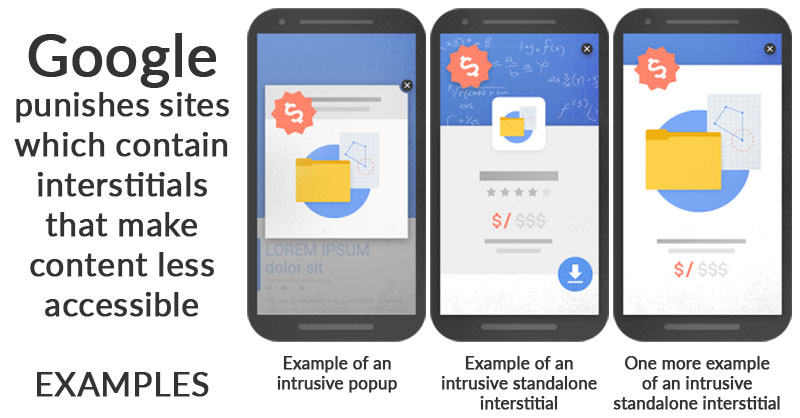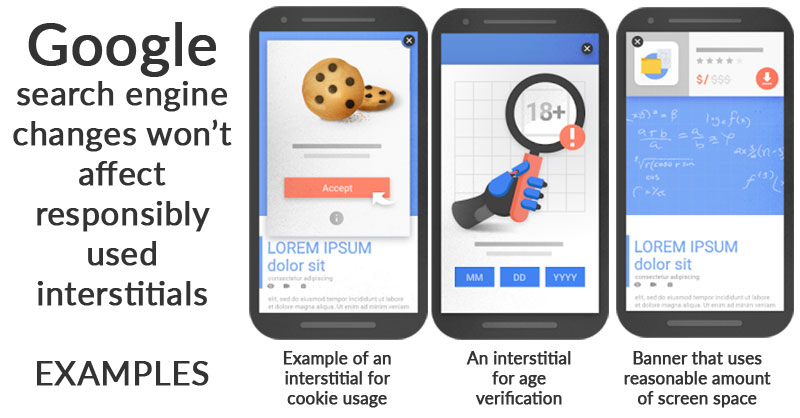Two changes will happen at once in the Google’s Search Engine. Google evolves as the mobile technology evolves, together with its users and their behavior. These changes are:
- Removing mobile friendly label from pages in mobile search results, and
- Punishing sites that show intrusive popup windows and interstitials over the content
- Removing mobile friendly label from pages in mobile search results
Google makes lot of effort to help people access content on mobile devices easily, and quickly. And not just any kind of content, but the one users are interested in, as well as the answers to their questions. So, relevancy, speed, ease, and accessibility are in Google’s focus, regardless of the type of devices used (laptop, desktop, or mobile).
We all know about the mobile friendly label Google added to mobile friendly sites, to help them stand out from the crowd of websites with tiny text and links you could only read if you zoom in on your mobile phone screen. A lot has changed during the last two years. Today, 85% of all websites retrieved from a mobile search are marked with a mobile friendly label. So, Google decided to remove this label, and unclutter the search results for mobile users.
This, however, doesn’t change the fact that mobile friendly criteria continues to exist as a ranking signal in Google’s search engine. Also, web developers will still be able to test their sites against this criteria. The label has been successful in motivating website owners to optimize their sites for mobile devices, and now it can retire. There’s no doubt that today nobody wants to make a website only for desktop computers.
- Punishing sites that show intrusive popup windows and interstitials over the content
Users search for relevant content. Usually, they are not interested in popup windows and commercials that hinder them from seeing the results of their search. Google knows this, and recently they recognized the tendency of a huge number of websites to use interstitials that are considered to be intrusive. This means that relevant content is present on the page retrieved by the search engine, but it is covered by the popup window. They also use the expression “interstitial” to describe the window that completely covers the content of the page.
On small screens of mobile devices, this can lead to a poor user experience, and Google wants to improve just that – The Mobile User Experience. Pages should be directly accessible to users, immediately after the search is done. And after January 10, 2017, the rank of those pages will go up on Google’s mobile searches, while the pages covered with interstitials may not rank so well.
Here’s what Google says about this in their blog:
“Here are some examples of techniques that make content less accessible to a user:
- Showing a popup that covers the main content, either immediately after the user navigates to a page from the search results, or while they are looking through the page.
- Displaying a standalone interstitial that the user has to dismiss before accessing the main content.
- Using a layout where the above-the-fold portion of the page appears similar to a standalone interstitial, but the original content has been inlined underneath the fold.”

However, Google takes into account the responsible use of this technique, and the change in its search engine will not affect the following:
- Interstitials with legal information (about cookies, user age verification)
- Login dialogs
- Banners that can be easily dismissed (and at the same time take reasonable amount of space on the screen)

Wait a minute. They say they can recognize the content and size of the interstitial. Fantastic. The Mobile User Experience is really going to be better.
Why is this change so important?
This is only one signal among hundreds used for ranking. Pages with great content, relevant to the search criteria, may still be positioned high in the mobile search results. They will be affected, and receive negative score under this criteria, so the final ranking result will be different than before.
With improved accessibility of content, Google makes mobile web competitive to the world of mobile applications. Will there be more initiatives like this one from Google? Certainly. They will aim at making mobile web stronger and more advanced, because they still can’t win over the leading position in mobile applications from Facebook.
